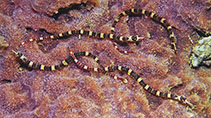| Family: |
Syngnathidae (Pipefishes and seahorses), subfamily: Syngnathinae |
| Max. size: |
10 cm SL (male/unsexed) |
| Environment: |
reef-associated; marine; depth range 0 - 31 m |
| Distribution: |
Indo-West Pacific: East Africa to Samoa, north to Ryukyu Islands, south to the Great Barrier Reef. Record from the Mascarenes (Ref. 9408) is apparently erroneous (Ref. 33390). |
| Diagnosis: |
Dorsal spines (total): 0-0; Dorsal soft rays (total): 22-30; Anal soft rays: 4-4. Description: Characterized by broad reddish-brown bands interspread with narrower pale bands; 10 caudal rays; rings 14 - 16 + 35 - 39; discontinuous superior trunk and tail ridges; straight lateral trunk ridge, ends near anal ring; continuous inferior trunk and tail ridges; length of snout 2.1-2.8 in head length; depth of snout 3.7-5.4 in snout length; head length 8.4-12.0 in SL (Ref. 90102). |
| Biology: |
Adults inhabit coral reefs (Ref. 9710). Ovoviviparous (Ref. 205). The male carries the eggs in a brood pouch which is found under the tail (Ref. 205). Males may be brooding at 5.0-5.5 cm SL (Ref. 5316). Also found in lagoons and seaward reefs (Ref 90102). |
| IUCN Red List Status: |
Least Concern (LC); Date assessed: 09 June 2016 Ref. (130435)
|
| Threat to humans: |
harmless |
Source and more info: www.fishbase.org. For personal, classroom, and other internal use only. Not for publication.
